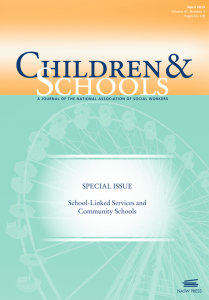 For more than two decades varied models of school-linked services and school–family–community partnerships have been advanced with the goal of improving the educational, developmental, mental health, health, and social outcomes for children and families.
For more than two decades varied models of school-linked services and school–family–community partnerships have been advanced with the goal of improving the educational, developmental, mental health, health, and social outcomes for children and families.
In a recent issue of the journal Children & Schools, published by NASW Press and Oxford University Press, researchers revealed their findings from a study on parental school engagement. This study presents an analysis of the impact of a school-based ecological model for parent engagement (EMPE) program on the social capital and efficacy among 469 predominantly African American, Latina, and immigrant mothers with preschool or elementary grade children in 64 Chicago public schools in low-income communities. Through a program of parent volunteers in schools that emphasizes the building of relationships between parents and teachers; parent leadership; and reciprocal parent, school, and community engagement, the EMPE program was found to promote improved social outcomes and significant gains in social capital and efficacy among program participants.
The results indicate that the parent mentor program was effective in engaging low-income, minority, and immigrant women in school-based volunteering activities that bolstered their social capital and individual and collective efficacy. Implications of this school–family–community partnership model for increasing parent–school engagement, volunteerism, social capital, and efficacy among low-income minority women are discussed, as are the implications of the EMPE for improving parent–school engagement and educational outcomes for children.
***
The journal Social Work is a benefit of NASW membership. It is available online or, at a member’s request, in print. Children & Schools, Health & Social Work and Social Work Research are available by subscription at a discounted rate for NASW members, either online or in print. You can find out more about the journals and subscriptions at this link.



